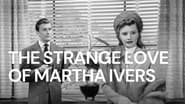Martin Bradley
The tagline could just as easily have read 'There's no-one better than Barbara when she's bad' and here Miss Stanwyck is as bad as can be. When not beating her aunt to death she's doing all she can to make sure her weak, alcoholic husband is re-elected DA while cheating on him with her childhood sweetheart. Lewis Milestone's "The Strange Love of Martha Ivers" is an overheated melodrama of small town corruption full of rotten characters and Barbara is the most rotten of all with hubbie Kirk Douglas not far behind. Van Heflin is the good guy who used to be a bad boy and Lizabeth Scott is the shop-soiled girl he falls for, (she's the film's weakest link). Milestone directed from a Robert Rossen screenplay and it's reasonably entertaining if a little convoluted. We could also be doing with a bit more of Stanwyck though both Heflin and Douglas, in his first film, are excellent and there's a nice supporting turn from Judith Anderson as the aunt who gets it. No classic then but very watchable.
zardoz-13
The best film noir movies rarely contain happy endings. Relief substitutes for the closure of a happy ending. Essentially, these films amount to unsavory tragedies about conflicted people who bring the curtain down on their sordid lives through their own frailties. They entangle themselves in a web of their own guilt and madness, and every effort they make to extricate themselves from their predicament seems to drag them deeper into that hellhole until they wind up destroying themselves. "All Quiet on the Western Front" director Lewis Milestone's "The Strange Love of Martha Ivers" exemplifies this description of film noir. A sympathetic but rebellious teenager, Martha Ivers (Janis Wilson of "Now, Voyager") hates her implacable aunt, Mrs. Ivers (Oscar nominated actress Dame Judith Anderson of "Rebecca"), because the latter abhors cats and refuses to let her change her last name back to her father's name Smith. Repeatedly, Martha tries to run away from this harridan. The first time that we see her attempt to leave Iverstown in 1928, the authorities catch her in a railroad freight car with a never-do-well teenage boy, Sam Masterson (Darryl Hickman of "Tea and Sympathy"), who has plotted their evening exodus. Sam wants to run away from his drunken father and join the circus, and Martha is willing to follow him. The police bring Martha back to her aunt, while Sam manages to escape. Martha has brought her cat back with her and she sneaks the forbidden animal back into the house. At one point, she is poised to flee again, while her tutor's son, Walter O'Neill, Jr., (Mickey Kuhn of "Red River"), explains that his father made him reveal their hiding place to the police. She is about to run away when Sam climbs through her upstairs window. A storm has erupted outside, and the electricity shuts down, plunging the house into darkness. Martha loses her cat, and the frightened feline makes its way down the staircase. Sam scrambles after the critter in the dark. When he hears Mrs. Ivers approach, Sam sneaks out of the house, because she has warned him that she will have him arrested and sent to reform school. The aunt encounters the harmless cat on the staircase and beats it repeatedly with her cane. Of course, the Production Code prohibited filmmakers from depicting acts of animal cruelty, so we don't catch a glimpse of the poor kitten suffering. A righteously indignant Martha snatches the cane from Mrs. Ivers. She whacks her once on the temple. The blow sends the old lady tumbling down the stairs. Walter's father (Roman Bohnen of "Brute Force") checks Mrs. Ivers, and he informs them that she is dead. Martha makes up a story on the spot that an intruder broke into the house and killed her mother. Mr. O'Neill goes along with their alibi, and years later a man is nabbed who fits Martha's description. Martha's husband Walter O'Neill Jr., (Kirk Douglas of "Campion") prosecutes him, and the man is hanged for a murder that he didn't commit. It doesn't help matters that the guy had a police record. Eventually, Mr. O'Neill coerces Martha into marrying his son. Meantime, Sam has left Iverstown and joined the circus. He makes his living as a professional gambler and has racked up a good war record. One evening Sam is cruising down the highway when it realizes that he has entered his old hometown. He is so amazed and distracted that he is back in Iverstown that he had left in 1928 that he smashes his DeSoto into a tree on the side of the road. When Martha and Walter learn about the arrival of Sam Masterson (Van Heflin of "Shane"), they suspect their worst fears that he has come back to blackmail them for the murder. Neither Walter nor Martha know Sam left the house that fateful evening before Mrs. Ivers fell down the stairs and died. Initially, a paranoid Walter wants to persuade Sam to leave the town, even if he must use force. At one point, he hires some pugnacious private detectives, and they haul Sam out of town and rough him up. Instead of intimidating Sam enough to scare him into packing, the beating prompts Sam to return to Iverstown. No sooner has Sam gotten back to town than he spots the hard-luck but beautiful dame, Toni Marachek (Lizabeth Scott of "Dead Reckoning"), that he has run into earlier. Reluctantly, she reveals that the police picked her up for breaking her parole, but they let her off when she agreed to set Sam up for the cops. By this time, Martha has heard about Sam's return, and she wants to see him. When they were kids, Martha was infatuated with Sam. She wants to turn back the hands of time and be with him. Sam confronts a drunken Walter and a conniving Martha at their palatial residence, and an argument ensues. Sam walks out the door in disgust. Walter shoots Martha, who helps him pull the trigger on her. As Sam rushes back to the house, Walter shoots himself in the chest deliberately, and he dies with Martha.As you can gather, "The Strange Love of Martha Ivers" eschews a happy ending. Clocking in just five minutes shy of two hours, this grim, melodramatic soap opera doesn't malinger for a moment. The performances are first-class, with Kirk Douglas making an impressive screen debut. Van Heflin plays Sam as a grown-up, and he regales everybody with the way he nonchalantly rolls a quarter on his knuckles. Barbara Stanwyck is tops as the femme fatale. The atmospheric film was carefully made, marvelously produced by Hal Wallis, superbly photographed, and doom hangs on the husband and wife like the Sword of Damocles'. Anybody born after 1965 who watches this classic but haunting narrative may be surprised to see Van Heflin repeatedly rolling a quarter on his knuckles the same way Val Kilmer did in the Kurt Russell western "Tombstone."
George Wright
This movie has a fine cast of 1940's stars but failed to live up to the great film noirs of that decade. With Barbara Stanwyck, Van Heflin, Lizabeth Scott and Kirk Douglas (in his first movie role) I expected a more powerful film. The stock script writing, and the lack of any real drama in this formula movie left me totally disappointed. Lizabeth Scott seemed to be the real presence on the screen and I relished every scene where she appeared. She did remind me of Lauren Bacall with her husky voice and tall stature. I also liked Judith Anderson, as the first Mrs. Ivers, who had a short but key role. Kirk Douglas, as the alcoholic political stand-in for his wife, delivered a strong performance in his first movie. As for the movie itself, it fell far short of other great film noir movies, Double Indemnity, The Postman Always Rings Twice, The Third Man and Key Largo. As with others of this genre, it did not have winners or losers, only victims and survivors.
jacobs-greenwood
Barbara Stanwyck plays the title role in this drama also starring Van Heflin and Kirk Douglas.As a child, Heflin left his small town on a train when it was suspected that he was responsible for a crime. He returns years later to find that the real culprit of the crime, Stanwyck, is married to the just elected district attorney, Douglas, though she wears the pants in the marriage given the fact that she inherited the family fortune upon her aunt's (Judith Anderson) death, the crime for which Heflin's character was suspected per his absence.Lizabeth Scott plays a transient woman Heflin picks up when he returns to town. Of course, Stanwyck is still attracted to her former beau, especially because her husband is rather wimpy and a drunkard to boot (that's right, Kirk Douglas against type!).Neither Stanwyck, who tries to seduce him, nor Douglas, who uses his newfound position to threaten him, want Heflin to reveal the true secret of the long forgotten crime.John Patrick's Original Story was nominated for an Oscar. Directed by Lewis Milestone with a screenplay by Robert Rossen.







